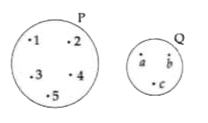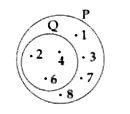If p+iq=0 then p+q is (i) 1 (ii)−1 (iii)−2 (iv)0
Step by step video & image solution for If p+iq=0 then p+q is (i) 1 (ii)-1 (iii)-2 (iv)0 by Maths experts to help you in doubts & scoring excellent marks in Class 12 exams.
Updated on:21/07/2023Similar Questions
Knowledge Check
Let A = {0, {0, 1}}. The cardinal number of P(A) is : (i) 8 (ii) 2 (iii) 4 (iv) 16
A8B2C4D16
p≡q(mod1) if (i) (p−q)∣1 (ii) 1∣(p−q) (iii)1∣p (iv) 1∣m
View SolutionExpress each of the following decimals in the form pq: (i) 0.1 (ii) 0.2 (iii) 0.3
View SolutionIf all the equations x2+px+10=0,x2+qx+8=0andx2+(2p+3q)x+60=0, where p,q∈R have a common root, then the value of (p−q) can be (i) −1 (ii)0 (iii)1 (iv)2
View SolutionIf 2x+1=15;3y−2=16ifx=p(mod5),y=q(mod5) then the value of p,q are (i) p=2,q=3 (ii) p=2,q=1 (iii) p=3,q=2 (iv) p=4,q=1
View SolutionFrom the adjoining Venn diagram , find the following sets :

(i) P
(ii) Q
(iii) P∪Q
(iv) P∩Q
View SolutionFrom the adjoining Venn , diagram , find the following sets :

(i) P (ii) Q (iii) P∪Q (iv) P∩Q
View SolutionIf α,β are the roots of the quadratic equation (p2+p+1)x2+(p−1)x+p2=0 such that unity lies between the roots then the set of values of p is (i) ∅ (ii) p∈(−∞,−1)∪(0,∞) (iii) p∈(−1,∞) (iv) (−1,1)
View Solution
